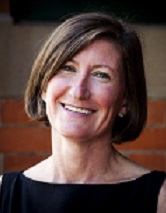Australia falls behind on UN Sustainable Development Goals

A lack of political interest in the United Nations Sustainable Development Goals is obstructing Australia’s progress as compared with other nations, says Whitlam Institute director Leanne Smith.
She issued this warning when addressing an AIIA Queensland webinar on October 27. Ms Smith, pictured above, is an international human rights lawyer, who completed her Master in Public Policy degree at Princeton University in the United States. She has extensive professional experience, having worked for the Australian Human Rights Commission, the United Nations, and Australia’s Department of Foreign Affairs and Trade as a diplomat.
Her current role is as the director of the Whitlam Institute, a public policy body which exists within the network of Western Sydney University. The online event was hosted by Justice Colin Forrest, who is a member of AIIA Queensland’s Executive Council.
The presentation tackled the question of UN’s Sustainable Development Goals and what Australia needs to change to successfully implement the SDG agenda. In September 2015, the UN Sustainable Development Summit was held in New York. At this event, 193 countries, including Australia, signed on to the 2030 Agenda for Sustainable Development, and committed to working towards 17 SDGs. Some countries have had much more success in implementing the agenda than others. In 2018, there was a parliamentary inquiry into Australia’s SDG implementation, which resulted in a report published in February 2019. It highlighted many ways Australia could improve its SDG progress, but it did not seem to jump start the Federal Government’s interest. To better understand why Australia might be trailing other nations, the Whitlam Institute took one of parliament’s recommendations, which said that Australia should look abroad in order to identify best practices. The Institute compared Australia’s SDG implementation to that of Germany, Mexico and Indonesia. This research was done in conjunction with Dr Claire Brolan of the University of Queensland’s Centre for Policy Futures and was published in June 2020 under the title No One Left Behind: Implementing the Sustainable Development Goals in Australia. If you are unaware of what exactly the SDGs are, you are not alone. One of the major issues the Whitlam Institute identified in their research was a lack of public awareness about the scheme. According to Smith and Brolan, the fact that the SDGs are not well known by the Australian public is a symptom of the Government’s lack of action. The lack of awareness also means there is very little push from the public to hold the Government responsible for its SDG commitments.
This cycle needs to be broken for Australia to get back on track and meet its SDG obligations by 2030. Overall, the Whitlam Institute’s report offered 12 total recommendations, based on the most effective strategies they distinguished in case studies of Germany, Mexico and Indonesia. Across the different approaches to the SDGs, they found that political will at the highest level of government, and throughout the system, was one of the strongest driving forces in each country. The report highlights Indonesia’s efforts to increase the political will for implementation at the provincial and local levels by communicating the SDGs in a way which provides context, local relevance and appeal. One of the biggest takeaways from this report is the recommendation that the Council of Australian Governments (COAG) must establish a Ministerial Council on the SDGs. However, it is important to note that the COAG has been replaced with the new National Cabinet and National Federation Reform Council. Despite this change, the sentiment that our federal leaders need to communicate and work together with local and state officials remains the same. Many of the 12 recommendations relate back to how the Federal Government can increase its partnership with local facilitators and develop policy which reaches into the communities of Australia. Other major recommendations include translating SDG guidelines into legislation, and adopting the language of the SDG agenda as our national framework for all discussions on development. As the end of 2020 approaches, 2030 looms ever closer. Ms Smith and the Whitlam Institute have identified many key areas where Australia is falling behind in our commitment to meet the SDGs by this deadline and have provided their recommendations to help combat this. She says it will take a real commitment from all levels of the Australian government and a significant increase in public interest for us to get back on track.
The 17 SDGs are as follows:
1. No Poverty
2. Zero Hunger
3. Good Health and Well-being
4. Quality Education
5. Gender Equality
6. Clean Water and Sanitation
7. Affordable and Clean Energy
8. Decent Work and Economic Growth
9. Industry, Innovation and Infrastructure
10. Reduced Inequality
11. Sustainable Cities and Communities
12. Responsible Consumption and Production
13. Climate Action
14. Life Below Water
15. Life on Land
16. Peace and Justice Strong Institutions
17. Partnerships to achieve the Goal